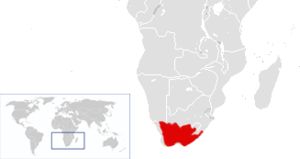| Equus quagga quagga |
|---|
 |
| Quagga mare at London Zoo, 1870, the only specimen photographed alive |
| Conservation status |
|---|
|
Scientific classification  |
|---|
| Unrecognized taxon (fix): | Equinae |
| Genus: | Equus |
| Species: | |
| Subspecies: | |
| Trinomial name |
|---|
†Equus quagga quagga
|
 |
| Former range in red |
| Synonyms |
|---|
List Hippotigris quagga Hamilton Smith, 1841
Hippotigris isabellinus Hamilton Smith, 1841
E. q. isabellinus Hamilton Smith, 1841
E. q. lorenzi Lydekker, 1902
E. q. greyi Lydekker, 1904
E. q. danielli Pocock, 1904
E. q. trouessarti Camerano, 1908
E. (Quagga) quagga quagga Shortridge, 1934 |
The Quagga (Equus quagga quagga), also Cape Quagga, is a recently extinct zebra.
It was one of the six subspecies of plains zebra. It was a yellowish-brown zebra with stripes only on its head, neck and forebody, and looks similar to an Okapi. The Quagga was native to dry grassy plains in the south of the African continent. It was found as far north as the Orange River. It is believed to have separated from other plains zebras between 120,000 and 290,000 years ago. The name Quagga comes from the noise that they made. (kwa-ka-ka) (qua-ga-ga).
The Quagga was hunted for food, for their skin and also because farmers did not want it to eat the grass they needed for their sheep and goats. The last wild Quaggas died during a drought in 1878. The last captive Quagga died in the Amsterdam Zoo on 12 August 1883. Her body is now in a museum. There are 23 Quagga specimens in museums, seven skeletons, and some skulls and other bones.




